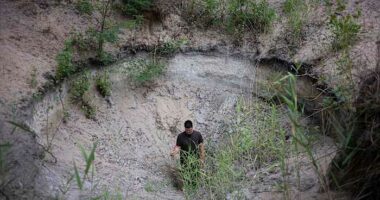Share this @internewscast.com
EL PASO, Texas (Border Report) – The Trump administration’s asylum freeze is exposing stranded migrants to abuse from criminals and authorities south of the border.
So says a coalition of nonprofits who recently interviewed dozens of asylum-seekers now scattered throughout Mexico with lots of fears and little monetary resources.
“We wanted to shed light on what is happening and bring forward people’s testimony. We wanted to do them justice and for Congress to uphold asylum and refugee law regardless of manner of entry,” said Jesus de la Torre, assistant director for global migration at Hope Border Institute in El Paso. He is the lead author of the report “Crushed Dreams: The Impact of the Trump Administration on Migrants.”
The report documents several cases of migrants who turned themselves in to U.S. authorities to claim political asylum and were instead turned back, detained or handed over to Mexican authorities who bused them to southern Mexico.
The ones turned back say border officers at ports of entry told them, “Go back. There is no asylum” on several occasions.
Those residents of Central and South America and places as far away as India who were sent back had previously endured violence and kidnapping in Mexico, according to the report.
The turn-backs and summary deportations happened after Trump on Jan. 20 canceled about 30,000 asylum appointments and shut the door on 270,000 others waiting for one through the CBP One app. That online tool now is called CBP Home, and the government expects migrants to use it to report they intend to depart the United States.
Trump proclaimed a national emergency based on the millions of people who showed up at the U.S. border in the past four years and augmented a year-long backlog in immigration courts. Some, who later turned out to be gang members, were released from overcrowded processing centers with a paper saying they would show up to court dates months and years in the future.

The asylum-seekers crossed the border despite the suspension of asylum because they did not feel safe in Mexico. But they found an administration that allegedly labels migrants as gang members indiscriminately, the advocates say.
“The Venezuelan population is very burdened by this idea that all of them are members of Tren de Aragua,” De la Torre said, referring to a transnational Venezuelan gang. “Many have been stigmatized; many are being persecuted for that. Most of these (Venezuelan) migrants are fleeing a very repressive regime, are fleeing an economic instability we have rarely seen in this (hemisphere). It has been one of the largest exoduses in the world.”
The report documents the case of four Venezuelan siblings who surrendered and were immediately told by border officers they were Tren de Aragua members. They were deported without an opportunity to demonstrate to an immigration judge they weren’t gang members and tell him why they felt they qualified for asylum, De la Torre said.
They are now in Mexico, in harm’s way.
The report also highlights the case of a Venezuelan single mom who was making her way to the U.S. border with her underage daughters when abducted in Panama’s Darien Gap. Criminals abused the woman and the girls before letting them go. The females were taken captive in Chiapas, Mexico, too. They were released when one of the daughters, an epileptic, suffered a seizure.
By the time they reached the U.S. border amid the forced delays, Trump had taken office and shut down asylum, according to the report.
De la Torre said he hopes the Mexican government will make good on regulations to treat migrants humanely and provide protection to them.
“COMAR, the refugee agency in Mexico, is not responding to asylum applications in a timely manner,” he said. “They are not getting documents so they can work in Mexico or place their children in schools. They are going to the big cities like Monterrey and Mexico City to find jobs, and that means moving inside Mexico, which is proving very dangerous.”
And military and immigration checkpoints that previously only stopped vehicles headed north to the U.S. border are now also checking vehicles coming from the north, further exposing migrants to abuse, he said.
The report documents the testimony of migrants who said they were verbally and physically assaulted by Mexican authorities, sometimes in collusion with criminals.
“They robbed us, they left us naked,” a Costa Rican migrant identified as “Gerardo,” told the nonprofits. Later, the migrant and his group managed to get on a bus. “That is when police robbed us on the bus. After the robberies, they knew we no longer had money. The bus stopped at a checkpoint and handed us over” to Mexican immigration agents.










